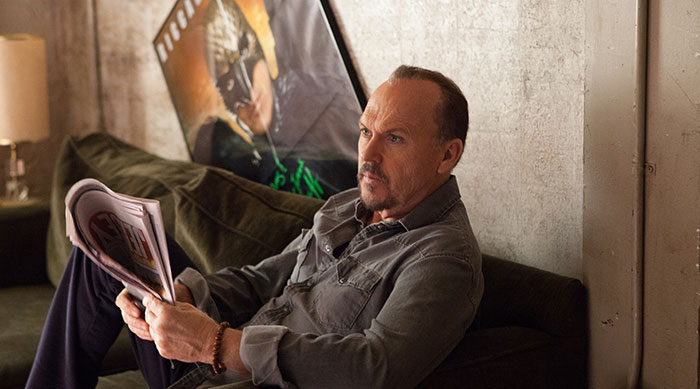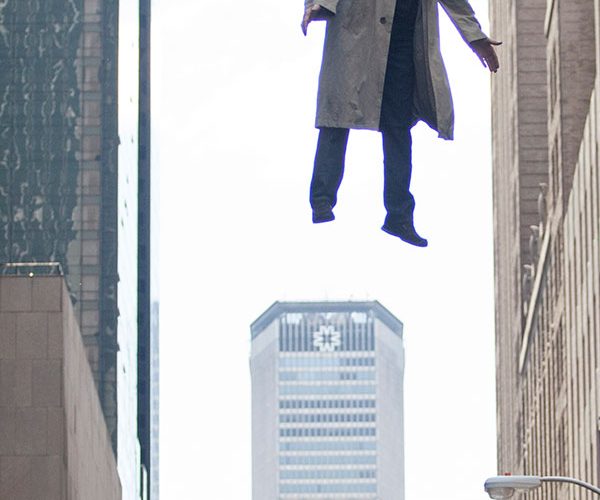Let me be honest about something: I don’t care about film. To me, there’s little difference between a holiday blockbuster and an artsy, independent horror flick from South Korea or the Netherlands. What I do care about is beer, and I admit I’m pretty one-dimensional about it—I’ve been known to find any possible excuse to steer a conversation back to the subject. So after friends dragged me to see Birdman, it should come as no surprise that what I got out of the film was a lesson about beer.
Actually, the experience of watching the movie isn’t what made an impression on me. It was later, when I told one of my buddies that I’d recently seen it. He cringed, expecting me to say that I didn’t like it…and he was right. Although Birdman is nominated for an Academy Award [Update: has now won the Academy Award for best picture] and has a bunch of characters I enjoyed, overall I wasn’t a fan—and I launched into a detailed explanation.
My friend nodded along as I lectured him on why I didn’t care for Birdman, and then he said: “Did you notice that one scene was filmed for like 15 minutes straight through?”
I hadn’t. It would never have occurred to me to pay attention to the way a movie was shot. But thinking back on it, I had to admit that scene was pretty cool. The camera followed the action through a backstage labyrinth for minutes without a cut, seamlessly picking up on a new conversations or introducing new characters.
Considering the process that went into making the film, instead of just my gut reaction, gave me a whole new way of thinking about something that, just seconds before, I had been criticizing. My first impression of the movie started to fade, and you know what Birdman started to remind me of? Beer!

Beerman
In Birdman, the main character (played by Michael Keaton) leaves a lucrative job making action films to pursue “real” acting on Broadway—writing, producing, directing and assuming the starring role. It’s no spoiler to say that the pressure weighs heavily on him, both in terms of his desire to create a well-received show and his need to succeed in reinventing himself and his career. Those of us who know craft brewers have heard a similar story time and time again.
Around the same time I saw Birdman, being that one-dimensional beer guy, I braved snow-packed roads to check out a new brewery that had recently opened. It was a weekday afternoon, so the place was empty except for three local homebrewers, front and center, chatting about “flocculation.”
I perched on a stool with the best view of both the tap list and the brewery. Before long I was greeted by the owner and brewmaster. While passing me samples that weren’t on the tap list and letting me taste a Belgian-style dubbel that was just about ready to be conditioned, the owner told me the story of why he decided to start a brewery.
While the details were unique to him, the tale was almost cliché: A passionate homebrewer, unfulfilled and burnt out by his corporate job, takes the leap into the world of professional brewing. Go to ten new breweries and you’ll hear some iteration of that story seven times.
What isn’t always conveyed in the story is the hard work and deep personal investment that goes into starting a brewery. Getting rid of the hated “nine-to-five” feels great, but new brewers have to overcome financial hurdles as well as their own self-doubts. Perfecting the recipes is just one of many concerns like: Will the inspection go well? Will the licensing get approved? Will the equipment come on time? Will there be enough beer to get through the first week? Will people like the beer? The pressure to succeed is seemingly insurmountable.
I spoke with the owner a bit longer, and watched a good number of growlers get refilled. It was great to hear that the neighborhood had really embraced his brewery. After a while, our conversation turned to critics and reviews. He said that very early on, a woman at the bar checked in on the Untappd app to write that one of his beers tasted like “beaver butt.” His business partner took it more personally than he did, but it made me wonder: What would Birdman do?
Everybody’s a Critic
 In the climax of the film, Birdman’s protagonist has a showdown with the villain, a cold, entitled, elitist theatre critic. She tells him that no matter how the opening night performance goes, she plans on giving it a terrible review. Her words are essentially a death sentence for the show.
In the climax of the film, Birdman’s protagonist has a showdown with the villain, a cold, entitled, elitist theatre critic. She tells him that no matter how the opening night performance goes, she plans on giving it a terrible review. Her words are essentially a death sentence for the show.
Now, one negative comment on Untappd is probably not as serious as a bad review in the New Yorker. But social media is filled with uninformed and unconstructive comments about beer. Half the time they’re complaints about “hipsters ruining craft beer” or claims that a certain beer or brewery “sucks.”
People are entitled to have their own opinions, but that doesn’t mean they’re qualified to give one. I’m certainly not qualified to share my opinions about movies! And just because someone has the ability to pound on a keyboard doesn’t mean they have the authority to make informed criticisms of beer.
Even those who know a lot about a subject, like Birdman’s theater critic, sometimes let their gut reactions get in the way—just like I did when first describing the movie to my friend. But as I learned when I started to think about the process of making the film, all it takes to change an opinion is to look at something a different way.
I wonder if the Untappd reviewer would have been more positive (or at least more constructive) if she’d thought about all the work that goes into starting up a brewery, and all of the weighty expectations brewers place on themselves. Maybe she would have found a little compassion and thought twice before comparing someone else’s dream to the back end of a woodland creature.
So before you criticize and crucify a beer or a brewery based on a first impression, try to find another perspective. Talk to the owners and brewers. Ask about what it took to get the brewery up and running. And try to make your feedback helpful, even if you don’t love everything about it. Give the brewers a chance to persevere and prove themselves — just like Birdman. He managed to get the reviewer to see things differently and rewrite her bad review, and he went on to be a huge success.
Or at least, I think that’s what happened—I left to grab a beer before the movie ended.
CraftBeer.com is fully dedicated to small and independent U.S. breweries. We are published by the Brewers Association, the not-for-profit trade group dedicated to promoting and protecting America’s small and independent craft brewers. Stories and opinions shared on CraftBeer.com do not imply endorsement by or positions taken by the Brewers Association or its members.


Share Post